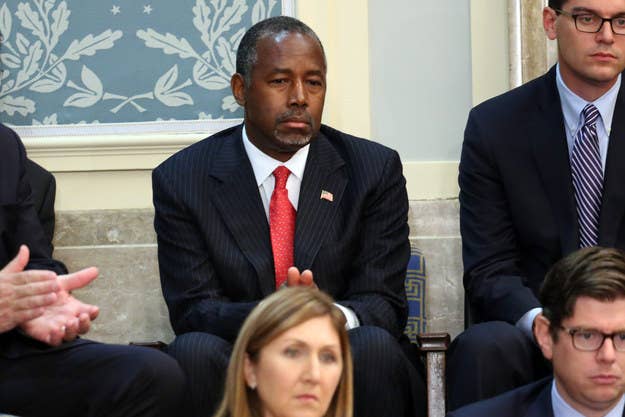
Ben Carson says he is "very glad" his comments in the aftermath of the shooting in Oregon about attacking the shooter have started a conversation about the appropriate way to react during a mass shooting.
The former neurosurgeon and Republican presidential candidate has been criticized in the past week for telling Fox News that if he had been at the shooting he would have attacked the gunman to prevent him from killing more people.
"Not only would I probably not cooperate with him, I would not just stand there and let him shoot me," Carson said on Fox. "I would say, 'Hey guys, everybody attack him. He may shoot me, but he can't get us all.'"
Responding on Wednesday to the controversy over his comments, Carson said he thought the "sacrifice" of those in Oregon might be what triggers what he called an "appropriate response" next time to prevent less death.
"I'm very glad to be able to inspire a conversation about what people should do when they get in these situations, not a criticism of people who've been in the situation before," Carson told radio host Lars Larson.
"In fact, you know, their sacrifice may be the thing that will trigger an appropriate response the next time so that not as many people will be killed."
Carson cited Flight 93, which crashed in Shanksville, Pennsylvania after passengers fought back against al-Qaeda hijackers.
"I believe that's the case and remember with, you know, Flight 93 over Pennsylvania. You know, they decided that, you know, if they were going to go down, you know, they were going to go down trying and I believe that if, you know, you don't really see hijacking situations anymore, but if you did see one I think you'd see a lot of passengers get up and attack the person," stated Carson.
Here's the full transcript of the exchange:
LARS LARSON: You're in the middle of what the media likes to call a controversy, but I didn't think that you're remarks were that controversial. It concerned the shooting at Umpqua Community College in southern Oregon about a week ago now as we're doing this interview, in which you were asked, 'what you would've done had you been in that situation' and people I guess have twisted this to say Dr. Carson is criticizing anybody who didn't fight back against this gunman.
BEN CARSON: Which is absolutely absurd, but of course that's the world that we live in now. People don't actually listen to what's being said, they look for a way that they can twist it to create controversy and wars between people. And instead of setting up warfare between people we should be using our collective intellect to figure out how do we solve these problems. And I'm very glad to be able to inspire a conversation about what people should do when they get in these situations, not a criticism of people who've been in the situation before. In fact, you know, their sacrifice may be the thing that will trigger an appropriate response the next time so that not as many people will be killed.
LL: Well in fact I had the thought as I was seeing this made up controversy, cause I really think it is a made up controversy Doc, because I've had people ask me, 'what would you do' and I would say, 'well, this is what I would do' and they'd say 'are you criticizing someone that doesn't do that?' I say, 'no, you asked me what I would do.' When you said 'I would ask everyone to attack the gunman because he could only shot one of us at a time. That way we don't all wind up dead.' If that comment sticks in the minds in millions of Americans - and your words do seem to stick in minds and we can tell that from the polls - I would imagine that someday that if someone finds themselves in a situation like this they might think, 'this guy can't shoot us all at once. Let's, you know, let's yell at him and all run at him at once but it has to be done quickly.' I think you're words might just save a few lives.
BC: I believe that's the case and remember with, you know, Flight 93 over Pennsylvania. You know, they decided that, you know, if they were going to go down, you know, they were going to go down trying and I believe that if, you know, you don't really see hijacking situations anymore, but if you did see one I think you'd see a lot of passengers get up and attack the person.

